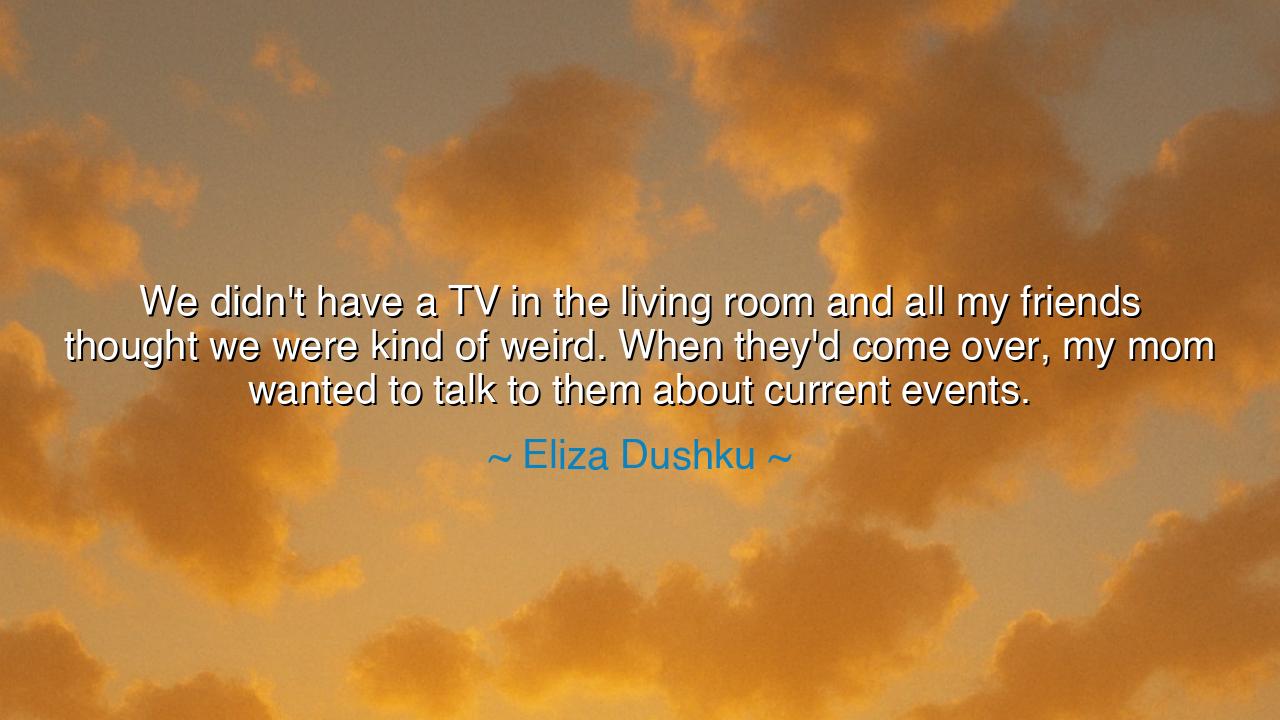
We didn't have a TV in the living room and all my friends thought
We didn't have a TV in the living room and all my friends thought we were kind of weird. When they'd come over, my mom wanted to talk to them about current events.






“We didn’t have a TV in the living room and all my friends thought we were kind of weird. When they’d come over, my mom wanted to talk to them about current events.” — thus spoke Eliza Dushku, and in her remembrance lies a teaching that transcends childhood embarrassment. It is the lesson that while the world often chooses distraction, true wisdom is forged in the crucible of dialogue, reflection, and engagement with reality. What seemed strange to the eyes of youth was in fact a form of sacred preparation.
The absence of the TV is no trivial matter. For in modern households, the screen in the living room is an altar of distraction, a glowing fire that pulls minds away from one another and into illusions. To remove it is to leave space, to invite presence, to insist upon human connection. Dushku’s mom, in choosing conversation over spectacle, was declaring war against the dulling of the mind. She knew that laughter, play, and even discomfort shared among people were worth more than endless hours before a screen.
When friends found it “weird,” they were reacting not only to difference but to challenge. The challenge was this: could they, as children, speak of the world beyond themselves? Could they enter into the realm of current events, where politics, history, and struggle unfold? To some it felt burdensome, but to those who listened, it planted seeds of awareness. For even a single conversation about the world can awaken a soul to its place within it.
The ancients understood this truth. Consider Socrates, who wandered the streets of Athens, refusing to distract himself with games or riches, but instead inviting strangers and friends alike to discuss virtue, justice, and truth. Many thought him odd, even irritating. Yet his conversations shaped Western thought for millennia. In the same way, Dushku’s mom, seated in her TV-less living room, was imitating the philosophers of old, turning the hearth into a forum of the mind.
The origin of Dushku’s memory lies in the tension between childhood desire and parental wisdom. As a girl, she may have longed to fit in, to be “normal,” to have a glowing screen and idle chatter like her peers. But her mom, steadfast and intentional, sought instead to give her something rarer: the habit of thought, the courage of dialogue, the capacity to see beyond herself. What was once embarrassing became, in hindsight, a gift of immeasurable worth.
The lesson is clear: what sets you apart as “weird” may in time reveal itself as wisdom. To choose conversation over distraction, substance over illusion, is to live deliberately. A TV may give the illusion of connection to the world, but true connection comes when we speak, listen, and reflect together. Do not be afraid to step apart from the habits of the many if it means walking closer to truth.
Practical action follows: create spaces in your home, however small, where conversation thrives over noise. Choose moments to set aside the screen and instead engage in talk of the world, of history, of justice, of dreams. Encourage the young to ask questions, to share opinions, even if imperfect. And when others call you “weird,” wear it as a crown—for it is often the strange who guard the gateways of wisdom.
Thus Eliza Dushku’s words shine as testimony. A living room without a TV, a mom who spoke of current events—these were not oddities, but acts of resistance, acts of love, acts of preparation for a life of depth. What seemed awkward in youth becomes luminous in memory. And so it is for all of us: the habits that make us different today may be the very treasures that guide us toward greatness tomorrow.






AAdministratorAdministrator
Welcome, honored guests. Please leave a comment, we will respond soon